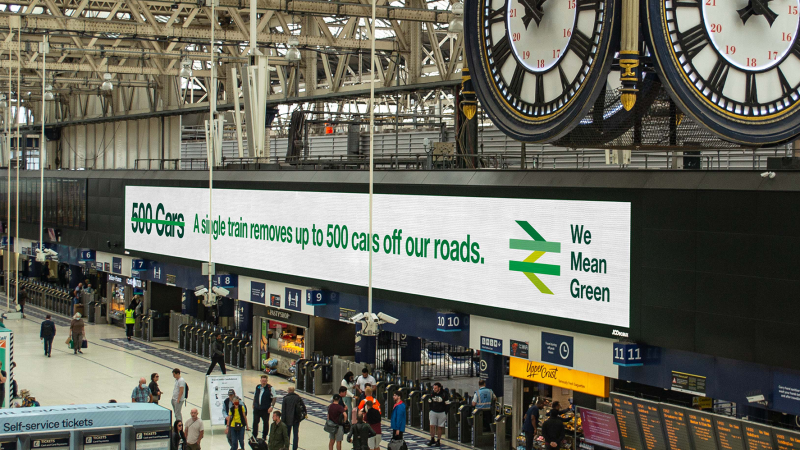
SPONSORED POST
Writing on World Car Free Day, Rail Delivery Group director general Andy Bagnall says choosing trains over road or air is vital to tackling the climate crisis.
Today, Britain’s train companies and Network Rail are coming together to give the classic double-arrows rail logo a green makeover and to declare that ‘We Mean Green’.
The aim is to remind people that while world leaders will soon gather in Glasgow to, we hope, make vital commitments to cut carbon emissions, there are choices we can make as individuals too, right now, that will help towards saving the planet.
Transport – how we get from A to B – is the single biggest source of pollution in Britain. Meeting the target of reaching net zero will, quite simply, be impossible without radical changes to how we move people and goods around.
Attention tends to focus on the new technology that will help tackle the challenge of decarbonisation. The assumption seems to be that with the right innovation we can all continue driving and flying much as we do today. In fact, behaviour change is going to be needed and there is no time to lose. A fantastically green form of transport already exists but it relies on people and businesses doing things differently.
As new commuting habits start to form with the return to work this autumn, there has never been a more important time to encourage people out of cars and on to trains. Recent research for the Rail Delivery Group found that just a 20% shift from rail to road would create an extra million tonnes of carbon emissions annually.
This is because when people choose the train, they cut their carbon emissions by two thirds compared to going by car. The goods carried on a single freight train take 76 lorries off the road. The humble train’s green credentials are beyond doubt – while they accounted for 10% of journeys, pre-pandemic, trains were responsible for just 1% of transport-related emissions.
Of course, the train will not be an option for every journey and for shorter distances, people should look to walk or cycle if they can. Yet in the many instances where taking the train is a viable alternative to more polluting modes, train companies and government have a responsibility to make rail an easier, more attractive choice.
If we are honest, that’s not always been the case. While we have spent billions of pounds upgrading trains and tracks, installed tens of thousands of bike spaces in stations and gone to great lengths to reassure passengers, in the face of the pandemic, that train travel is safe, there is much more to do.
Research has shown that around a third of people for whom trains are an option are put off by the complexity of rail fares. That’s why train companies have been working with the government, encouraging them to radically reform the fares system so that it is easier for people to get a good deal, to know they have paid the best price and to be sure they have the right ticket.
Then there is the thorny issue of cost. While reforming the fares system will go a long way to addressing negative perceptions about the value for money of train travel, the government has choices to make about the balance between passengers and taxpayers when it comes to who pays for the railways. This choice is made every year when government decides the increase to regulated fares, such as season tickets.
While many people never use the train, everyone benefits from it, whether it’s reduced road congestion, cleaner air or goods getting to supermarket shelves promptly by freight train. Over the last decade and a half, however, governments of all colours have sought to shift more of the price of rail travel away from taxpayers generally and onto passengers. While car drivers have benefitted from a decade long freeze in fuel duty and the government is considering cutting air passenger duty for domestic flights, taxes now make up 40% of the cost of electricity to power trains.
These are not policies that encourage green travel choices. Government should take a holistic approach and adopt a polluter pays principle towards transport levies across modes to encourage more people to take the train and more companies to choose rail to move their goods.
As train companies, we believe passionately in the potential for our sector to help tackle the climate crisis. We’re not resting on our existing green credentials though. We are replacing older, more polluting trains for newer, greener models and we’ve published a high-level strategy to bring greener power – whether electric, battery or hydrogen – to the tracks.
That’s why, today, as we look ahead the UN climate summit, Britain’s rail industry is confident in declaring that We Mean Green.





More from LabourList
‘After years of cuts, Labour’s local government settlement begins to put things right’
‘The Sherriff of Wild Westminster: what must change in elections bill’
‘The hope that kills you’: Reflections from the final day in Gorton and Denton